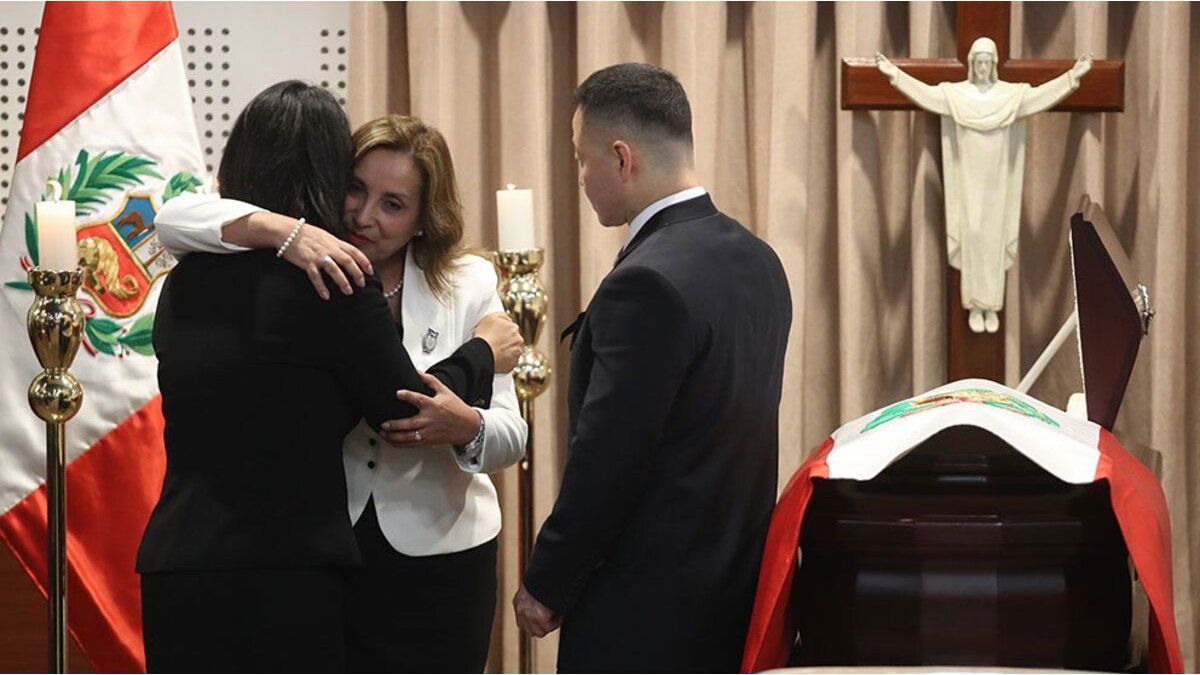The president of Peru, Dina Boluartebid farewell to the former president with honors Alberto Fujimori, who died last Wednesday at the age of 86. Previously, a ceremony took place in the National Grand Theatrewhere only his family and friends were present. This Saturday, Thousands of Peruvians gathered to say their last goodbyes.
Fujimori suffered from various health problems, including tongue cancer, atrial fibrillation, lung ailments and hypertension. His health deteriorated rapidly last week, after finishing a radiotherapy treatment of the mouth. Nine months ago, the politician had been released from the Barbadillo prison, where he spent 17 years for the 25-year sentence he received for crimes against humanity during his government. Last year, he received a humanitarian pardon due to the physical difficulties mentioned.
Boluarte, who was an opponent of Fujimori, silently led the brief tribute The ceremony took place in the main courtyard of the Peruvian Executive headquarters. Covered with the national flag, the coffin was carried on the shoulders of a team of six porters and escorted by a cavalry battalion of the Hussars of Junín, which make up the presidential guard.
fujimori.webp
Thousands of people attended the Ministry of Culture in Peru.
AFP
His wake took place at the Ministry of Culturewhere thousands of Peruvians lined up to say their last goodbyes to the former president Sentenced in 2009 to 25 years for “crimes against humanity” for the massacres of Barrios Altos and La Canutawhere 25 people were killed by the army under the orders of the then president.
“You are finally free,” her daughter said.
As for the private ceremony that was carried out by his family, the building had an altar with white roses and a large-scale reproduction of an image of Fujimori. Drenched in tears, his son Kenji He praised the government work of his father – popularly known as “El Chino” – and recalled that as a son he lived “always a farewell” when Fujimori was imprisoned for 16 years before being pardoned in December for humanitarian reasons.
“The people recognize who is the best president (…) Fujimori will never die!” Kenji was moved. His daughter too Keikoa former presidential candidate, took the lectern to honor the former president.You are finally free from hatred and revenge (…) you are free from those 16 years of unjust imprisonment (…) the Peruvian people have absolved you of so much persecution,” declared the leader of the Fujimorist party. People’s Force.
Finally, after the state honors that Boluarte paid him, The president was taken to the Huachipa cemetery, in eastern Lima.
His role in politics
In recent decades, Fujimori played a central role in Peruvian politics and his political movement, Fujimorism, reached three runoff elections led by Keiko Fujimori.
For Hector Villaloboseditor of Politics of the Peruvian newspaper El Comercio, “both for his followers and for his detractors, the political impact that the figure of Fujimori has had is undeniable”, since the last three elections “were marked by the confrontation between Fujimorism and anti-Fujimorism and it is this polarity that led to defining them.”
For his part, the political scientist Eduardo Dargent He maintains that Fujimori “has become a symbol for a sector of the rightpeople who didn’t even know him, but who use him and what Fujimorism was for their current political fights.”
“Fujimorism institutionalized a series of economic policies “These are going to be key to understanding Peru today, with good and bad things. Fujimori was the political face of an alliance that allowed many of the institutions that have endured to be built over 10 years,” he explains.
Regarding the current lament of a certain sector of the population, Villalobos states that “it is because the figure of Fujimori continues to polarize and will continue to do so long after his death.” “He maintains a large base of followers because they are grateful for the success in defeating terrorism and economic recovery“, he warns.
However, the journalist points out that this should not leave aside the institutional breakdown and takeover and human rights violations that occurred during his regime. “His death closes an important chapter in our history and leaves behind a political force that bears his name,” he stressed.
Along the same lines, Dargent states that although “many of the legacies of Fujimorism are terrible in the sense of deinstitutionalizing, disrupting and destroying,” one must not “fail to recognize that It marked politics in Peru in many different ways”.
Source: Ambito




